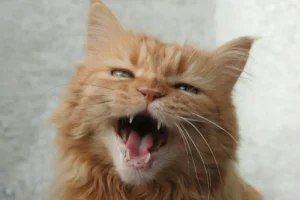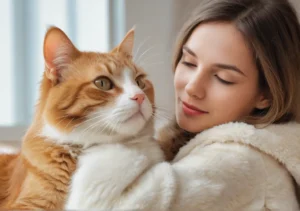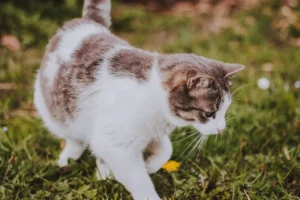Cats are known for their early morning serenades, but have you ever wondered why they are so vocal at the break of dawn? Let’s explore the reasons behind this feline behavior.
Cats’ Natural Instincts
Cats are inherently crepuscular creatures, meaning they are most active during dawn and dusk. This is a survival instinct that stems from their wild ancestors, who were more active during these times to hunt for food and avoid predators. So, when your cat is meowing up a storm in the morning, it’s likely because they are wired to be active and vocal during this time.
Communication with Humans
When your cat meows in the morning, they aren’t just making noise for the sake of it. Cats actually use different types of meows to communicate specific needs and desires with their human companions. For example, a short, sharp meow might mean they are hungry and want food, while a more drawn-out meow could indicate they are feeling lonely and seeking attention. By paying attention to the tone and frequency of your cat’s meows in the morning, you can better understand what they are trying to tell you.
Here are a few common reasons why cats are so vocal in the morning:
- Hunger: Cats may meow in the morning because they are hungry and want to be fed.
- Attention: Your cat may meow to get your attention and engage with you.
- Routine: Cats are creatures of habit, and they may meow in the morning as part of their daily routine to signal they are ready to start the day.
Seeking Attention
Ever wake up to your cat’s loud meows in the morning? It’s not just your feline buddy being a chatterbox; they might just be looking for some love and attention. Cats are social creatures that enjoy interacting with their human companions, and what better way to get your attention than with a vocal wake-up call? So, next time your cat serenades you at sunrise, know that they just want to spend some quality time with you.
Hunger and Mealtime
Is your cat treating you to a morning concert of meows and yowls? It could be their way of saying, “Hey, where’s my breakfast?” Cats are creatures of habit, and their internal clocks are finely tuned to mealtime. If your furry friend is meowing up a storm in the morning, it might be their way of reminding you that it’s time to fill up their food bowl. Keep their tummies happy, and those early morning vocal performances might just quiet down a bit.
Here are a few extra tips to help reduce your cat’s morning vocalizations: 1. Ensure your cat’s meal schedule is consistent to avoid hunger-induced meowing. 2. Incorporate interactive toys and playtime in the evening to help expend your cat’s energy before bedtime. 3. Consider leaving out some toys or puzzles for your cat to play with during the night to keep them occupied.
Environmental Stimuli
When your feline friend starts their morning serenade, it could be influenced by various environmental factors. Sunlight streaming through the windows might trigger their vocalizations, signaling the start of a new day. Cats are crepuscular creatures, meaning they are most active during dawn and dusk, so the first light of morning might prompt them to communicate.
Another environmental factor that could contribute to their morning chatter is wildlife outside. Birds chirping, squirrels playing, or other animals moving about can pique your cat’s curiosity and lead to more vocalizations as they observe the activity from indoors. This natural instinct to communicate and react to their surroundings can make mornings a particularly vocal time for our feline companions.
Health Concerns
While morning vocalizations from your cat are often a normal part of their routine, it’s essential to pay attention as these sounds could also signal underlying health issues. Sudden changes in their vocal patterns, such as increased frequency or intensity, could indicate discomfort or pain.
If your cat is meowing more than usual in the morning, it’s a good idea to observe their behavior for any other signs of distress. They may be trying to communicate something is wrong, such as a dental problem, arthritis, or other health concerns that require attention from a veterinarian.
To ensure your furry friend’s well-being, consider scheduling a check-up with your vet if you notice any significant changes in their morning vocalizations. It’s always better to be proactive when it comes to your cat’s health and happiness.
Tips for Managing Morning Vocalizations
If you find yourself awakened by your feline friend’s early morning serenades, fret not! There are ways to manage and address this behavior:
Establish a Routine: Cats are creatures of habit, so try to stick to a consistent feeding and play schedule. This can help reduce their need to vocalize in the morning.
Provide Enrichment: Make sure your cat has plenty of toys and activities to keep them entertained during the night. Interactive toys and puzzle feeders can help stimulate their mind and tire them out.
Ignore the Meowing: It can be tough, but try not to reward your cat’s morning meows with attention. If you give in and feed or pet them when they meow, you reinforce the behavior.
Consult with a Vet: If your cat’s morning vocalizations are excessive or sudden, it’s a good idea to consult with a veterinarian. They can rule out any underlying medical issues causing the behavior.
Invest in a Timer Feeder: If your cat is an early riser due to hunger, consider investing in a timer feeder that dispenses food at a set time. This can help satisfy their morning cravings without you needing to be up.
Remember, patience is key when addressing your cat’s morning vocalizations. With time and consistency, you can help curb this behavior and get a peaceful night’s sleep.
Fun Facts about Cat Vocalizations
Did you know that cats can make over 100 different sounds, while dogs only have about 10? It’s true! Here are some other fun facts about cat vocalizations:
Purring Power: Cats don’t just purr when they’re content – they also purr when they’re injured or in pain. Some researchers believe that purring helps cats self-soothe and promote healing.
Meowing to Humans: Cats rarely meow to communicate with other cats. Instead, they have developed this vocalization specifically to communicate with humans. So, when your cat meows in the morning, they might just be saying, “Hey, wake up and feed me!”
Volume Control: Cats are capable of adjusting the pitch and volume of their meows to manipulate their humans. Research has shown that cats tend to use higher-pitched meows to solicit food and lower-pitched meows for attention.
Chirping Chatter: Some cats make a unique chattering noise when they see birds or squirrels outside. This behavior is thought to mimic the sound of a bird’s chirp and is a sign of excitement and frustration.
Next time your kitty serenades you in the morning, remember these fun facts about cat vocalizations and appreciate the unique ways our feline friends communicate with us.
Alex, a passionate animal lover, has experience in training and understanding animal behavior. As a proud pet parent to two dogs and three cats, he founded AnimalReport.net to share insights from animal experts and expand his knowledge of the animal kingdom.




